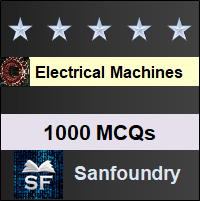
Electrical Machines Multiple Choice Questions Highlights
- 1000+ Multiple Choice Questions & Answers (MCQs) in Electrical Machines with a detailed explanation of every question.- These MCQs cover theoretical concepts, true-false(T/F) statements, fill-in-the-blanks and match the following style statements.
- These MCQs also cover numericals as well as diagram oriented MCQs.
- These MCQs are organized chapterwise and each Chapter is futher organized topicwise.
- Every MCQ set focuses on a specific topic of a given Chapter in Electrical Machines Subject.
Who should Practice Electrical Machines MCQs?
– Students who are preparing for college tests and exams such as mid-term tests and semester tests on Electrical Machines.- Students who are preparing for Online/Offline Tests/Contests in Electrical Machines.
– Students who wish to sharpen their knowledge of Electrical Machines Subject.
- Anyone preparing for Aptitude test in Electrical Machines.
- Anyone preparing for interviews (campus/off-campus interviews, walk-in interview and company interviews).
- Anyone preparing for entrance examinations and other competitive examinations.
- All - Experienced, Freshers and College / School Students.
Electrical Machines Chapters
Here's the list of chapters on the "Electrical Machines" subject covering 100+ topics. You can practice the MCQs chapter by chapter starting from the 1st chapter or you can jump to any chapter of your choice.- Magnetic Circuits
- Basic Concepts in Rotating Machines
- Constructional Features of Rotating Electrical Machines
- Principles of Electro mechanical Energy Conversions
- Rating and Loss Dissipation
- Electrical Machine Applications/Armature Reaction and Commutation
- Electromechanical Energy Conversions
- DC Machines
- DC Generators
- DC Motors
- Synchronous Machines
- Synchronous Generators
- Synchronous Motors
- Efficiency and Regulation
- Synchronous Machine Stability
- Induction Machines
- Starting of Induction Motors
- Armature Windings
- Transformers
1. Magnetic Circuits
The section contains multiple choice questions and answers on singly exicted magnetic systems and energy conversion principles.
|
|
|
2. Basic Concepts in Rotating Machines
The section contains questions and answers on reluctance motor, synchronous motors, singly and doubly excited systems, torque production, rotating machines terms and rotating magnetic field.
3. Constructional Features of Rotating Electrical Machines
The section contains MCQs on constructional features of rotating electrical machines.
|
|
|
4. Principles of Electro mechanical Energy Conversions
The section contains multiple choice questions and answers on generated emfs.
|
|
5. Rating and Loss Dissipation
The section contains questions and answers on losses and efficiency, machine ratings and loss dissipation.
|
|
|
6. Electrical Machine Applications/Armature Reaction and Commutation
The section contains MCQs on machine applications and action of commutator.
|
|
|
7. Electromechanical Energy Conversions
The section contains multiple choice questions and answers on emf generation in armature and torque in dc machines.
|
|
|
8. DC Machines
The section contains questions and answers on dc machine applications and its circuit models, mmf and flux density waveforms in dc machines, methods of excitation, efficiency and testing of dc machines.
9. DC Generators
The section contains MCQs on rotating amplifiers and operating characteristics of dc generators.
|
|
|
10. DC Motors
The section contains multiple choice questions and answers on characteristics of dc motors and speed control of dc motors, pmdc and dc motor starting.
|
|
|
11. Synchronous Machines
The section contains questions and answers on physical concepts, Emf Polygons, power angle and power factor control of synchronous machines, excitation systems for synchronous machines, flux and mmf phasors in synchronous machines,synchronous machine applications and measurement of xd and xq.
12. Synchronous Generators
The section contains MCQs on characteristics of alternators, phasor diagram of a cylindrical rotor alternator and also voltage regulation of an alternator.
|
|
|
13. Synchronous Motors
The section contains multiple choice questions and answers on synchronous motor phasor diagram, starting of synchronous motors and power factor correction.
|
|
|
14. Efficiency and Regulation
The section contains questions and answers on power flow through an inductive impedance, losses and efficiency of synchronous machines.
|
|
|
15. Synchronous Machine Stability
The section contains MCQs on synchronizing power and synchronizing torque, hunting and damper windings and synchronous machine stability.
|
|
|
16. Induction Machines
The section contains multiple choice questions and answers on principles of operations, rotor frequency, equivalent circuit and its analysis, induction motor phasor diagram and its operating characteristics, induction generator, circle diagrams of induction machines, flux, mmf phase and waves in induction motors.
17. Starting of Induction Motors
The section contains questions and answers on starting of polyphase induction motors.
|
|
|
19. Transformers
The section contains multiple choice questions and answers on transformer construction and phasor diagram, open circuit and short circuit test, voltage regulation of transformer, transformer losses and its efficiency, autotransformers, single phase transformer, three phase transformer and ideal two winding transformer.
Wish you the best in your endeavor to learn and master Electrical Machines!
